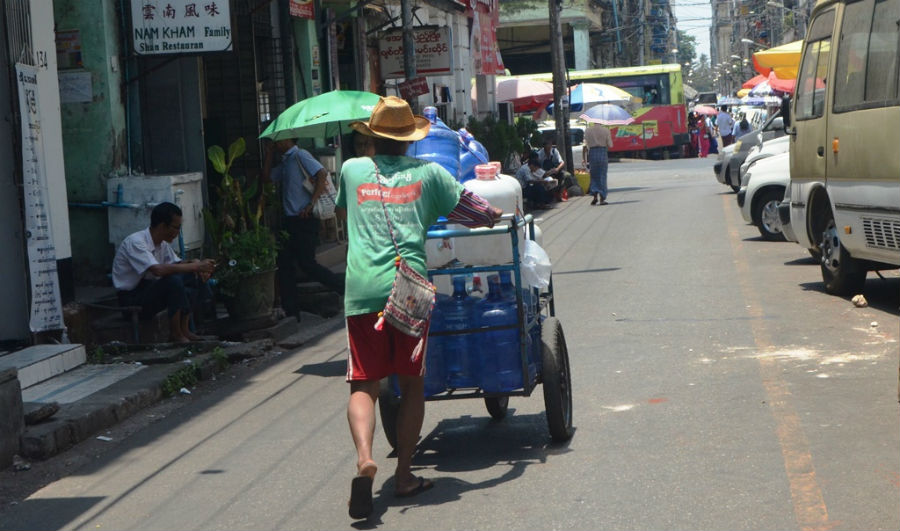When Myo Arkar returned to his home in Yangon’s North Dagon Township after working through a long, hot day, he opened a cold bottle of purified of water to quench his thirst, but as he drank he sensed a rusty smell and taste, and then noticed brown particles swirling in the bottle.
Disgusted, he threw it away. “I informed everyone I know of this incident, and reminded them not to drink that brand,” he said of the water, which is produced at a small purifying facility in Shwepyithar Township.
Many residents in Myanmar’s towns and cities consume bottled water that they presume is properly purified. But a rapid growth in demand for such water and a lack of government oversight means many small, unlicensed operators produce questionable quality water that regularly leaves consumers with a bad taste in their mouths.
“I have used more than four brands of drinking water last year. The new brand that I am using now has had no problem yet,” remarked Thura, a taxi driver from Sanchaung Township, who said he switches brands after drinking bad quality water, rather than file a formal complaint with health authorities.
UNLICENSED BRANDS ON SALE
Among Myanmar’s towns and city residents, around a third drink bottled water, according to data from the 2014 census, as urban water supply systems are often of a poor standard. Though urban consumers’ drinking water problems pale compared to those in the countryside – where many poor households rely on tube wells, ponds and lakes that might be unclean or even toxic – they could easily be consuming an unlicensed brand.
Dr. Tun Zaw, director of the Ministry of Health’s Food and Drug Administration (FDA), said an inspection of markets in Yangon and Mandalay last December found 21 unlicensed bottled water brands on sale.
A countrywide FDA survey of bottled water conducted early last year approved some 750 brands, but found 73 – or close to 10 percent – of brands lacking in quality, or having failed to register with the FDA. The FDA subsequently released a list of these banned brands and their production locations.
By law, drinking water producers are required to register with the FDA and allow it to inspect their facilities for hygiene, production methods and quality tests.
Dr. Kyaw Linn, a former FDA director, told Myanmar Now that consuming unlicensed drinking water could carry health risks. “Fungus and bacteria in this drinking water can pose health hazards, such as diarrhoea and worms, as well as other bad consequences depending on the harmful chemicals in the unhygienic water,” he said.
More needs to be done to improve enforcement of FDA standards, he said, adding, “Unregistered brands will not guarantee hygiene, they might even use tap water.”
GROWING THIRST FOR BOTTLED WATER
Myanmar’s economic growth of recent years has led to rising demand for bottled drinking water in both urban and rural areas, said Ba Oak Khaing, chairman of Consumer Protection Association of Myanmar. Setting up a small-scale purification facility is fairly simple and can even be done in a residential house or a compound, he said, adding that small facilities produce about fifty to a hundred 20-litre bottles per day.
Dr. Tun Zaw said such facilities had proliferated in recent years and it was impossible for the FDA to inspect all new brands coming on to the market, adding that enforcing a ban on brands was also difficult. “If we announce that a brand name produces unhygienic drinking water, they will just change their name, for example from ‘Sein’ to ‘Shwe’,” he said.
Dr. Tun Zaw said the FDA works with municipal authorities to enforce drinking water controls. The agency conducts tests and checks, and issues recommendations, while local authorities are responsible for granting licenses and implementing a ban and shutdown of facilities.
OUTDOOR PRODUCTION
Ba Oak Khaing said his association, the FDA, staff of Yangon City Development Committee (YCDC) and the police conducted surprise inspections of water producers’ facilities in Yangon in February and found that 13 failed to meet hygiene standards.
“These small water-purifying facilities are built in the compound of regular houses. They do not observe the rules of hygiene,” he said, explaining that some operations were situated in the open air, sometimes even near grazing cattle or sewage run-off.
Ba Oak Khaing said the FDA and municipal authorities issued bans against the 13 companies, but no further checks have been carried out since to enforce the order.
Ar Kar, the owner of Pin Lone Water, a large, licensed purifying plant in Yangon’s Hlegu Township, said many small operators had entered the growing drinking water market in a bid to capture a share, and some cared little for quality and hygiene standards.
“Some purified water might be tainted with dust and smells because the old water bottles were not thoroughly cleaned when they were re-used,” he said. “Such small water-purifying plants are copying our brands and these things may tarnish our popularity.”
One small, unlicensed bottled water producer from South Dagon said his facility turned out about fifty 20-litre bottles per day, which were sold in two residential quarters in the township. The man, who asked not to be named, admitted to not registering with the FDA, but said consumers of his water have nothing to fear.
“Most of the market for my brand is only in the nearby area, and I am focused on the hygiene of the water,” he said.
(Editing by Paul Vrieze and Ros Russell)
This article was originally published by Myanmar Now on April 30, 2016.




